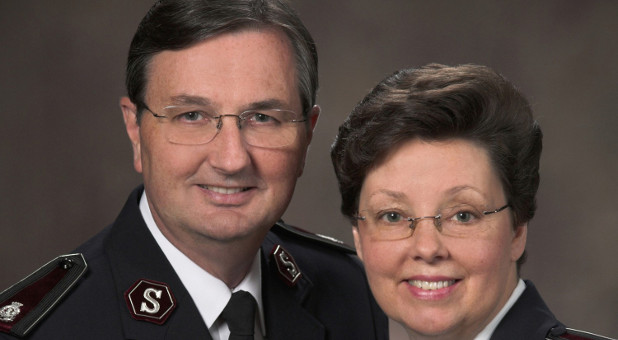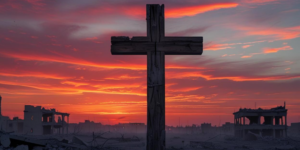Jim Knaggs: Leadership in the World’s Largest Ministry
Just when you thought you knew everything about The Salvation Army, someone comes along and completely changes that perception. Commissioner Jim Knaggs, with his wife Commissioner Carolyn Knaggs, lead The Salvation Army’s work in the USA Western Territory, including 14 western states, the Marshall Islands and Micronesia.
As Territorial Commander he reports directly to the General of The Salvation Army at International Headquarters in the United Kingdom. While The Salvation Army may be the largest nonprofit organization in the world, what drives Jim Knaggs is evangelism. That’s part of the reason he’s launched the army’s first global digital initiative called The Salvation Army Vision Network (SAVN.TV). It’s an online platform designed to share life-changing stories of the army’s work around the world.
Recently, media consultant and producer Phil Cooke talked with Jim about his career in ministry, the challenges of leading in the digital age, and the future of The Salvation Army:
PC: Over the last 34 years, you’ve filled a lot of roles for the Salvation Army. Did you start at the bottom? What was your introduction into the Army?
JK: My first job with The Salvation Army was selling Christmas “War Cry” magazines for 50 cents an hour. I imagine that was the bottom. My parents are Salvation Army officers, so I attended the SA church as a child. As a Commissioned Officer, my wife and I began by leading a summer evangelistic team throughout Eastern Pennsylvania, at a different location each week. With three street meetings a day and an indoor evangelistic meeting at night, I never repeated a message all summer, as I believed my team needed to hear a regular fresh message from the Word of God. From there, we served in inner city Philadelphia as Corps Officers leading a church and urban ministry. The subsequent 12 appointments have shown us that God has led our lives in places we never dreamed about, constantly expanding our capacity to love others in the journey.
PC: You’ve also served internationally. Where were you posted, and how did that impact your leadership style?
JK: We served in Melbourne, Australia, for four years as the Territorial leaders for half of Australia. It taught us even more convincingly that there were many ways to win the world for Jesus, not solely the ones we had seen at home.
PC: There’s a perception in some places that The Salvation Army is focused only on social causes. But a conversation with you is always about evangelism. Where’s the balance? What are your priorities?
JK: The Salvation Army is about winning the world for Jesus. The Lord’s command to love Him and our neighbor has indelibly impacted the movement to where the bipartite effort is seamless. We commonly refer to “soup, soap, and salvation” as our plan. In it you can detect the most successful progression to bringing someone to faith in Christ. They’ll never hear the voice of God if their empty stomach is growling. I see the prongs in unison, but always through the eyes of a loving God, who eternally cares for us.
PC: I understand that The Salvation Army is the largest nonprofit organization in the world, and you’re one of the top-level leaders. Does the organization have a program for developing the next generation of leaders?
JK: The Salvation Army is very locally driven. The international program for leader development is very institutional, but fixed in the crucible of the daily, local effort. Our leaders come from within. It affords us the luxury of intimate observation over seasons of productivity.
PC: From your experience, what are the key elements that make a great leader?
JK: Godly, visionary, hopeful, encourager, experienced, missionally committed.
PC: You have nearly 80,000 Twitter followers and a huge following on your blog at jimknaggs.com. What subjects do you like writing about the most?
JK: I like mission, inspiration and challenge. I also love to tell others what great things God is doing among us.
PC: Thousands of people start ministry organizations, but when William Booth founded The Salvation Army, it spanned generations and developed a global impact. What was different about his vision, and why do you believe it impacted the world in such a powerful way?
JK: I believe it was God’s idea. As a teen, Booth knelt at a church altar and said, “God shall have all there is of William Booth.” The global timing was right as the ministry expanded along the streams of the influence of the British Commonwealth. Poverty was rampant and people were in great need, physically, financially, and spiritually. Like a fire in a dry season, it flamed around the world. I do believe Booth had a great faith in God and was prepared to act upon it.
PC: The Salvation Army has entered the digital world through the website SAVN.TV. You were the driving force behind creating the site. Why is engaging today’s culture through digital and social media so important?
JK: Over 2.3 billion people are on the Internet today. We must use every possible means to bring people to God’s love. Social media is a natural way to do so. We can enter communities, neighborhoods, homes and hearts that have never been open to us before.
PC: Tell me about the future. What’s on your radar over the next 5-10 years?
JK: Next we’re investing in different languages and the cultural realities of different faiths to identify opportunities to bring them to faith. The Salvation Army is also perfectly positioned to make a major impact in reducing human trafficking, poverty, hunger, and more. In terms of social media, I see connections that digitally blend our friendships with our passions and increasing interest in access to the troubles in our world and the excitements at the same time. Soon it won’t matter what language you type or speak (mostly speak, less typing), the equipment will automatically translate depending upon your settings and we will have relationships with people simultaneously around the globe. It will redefine the borders and render them redundant as well as their local restrictions. We will have a better opportunity to understand different cultures and make better, more efficient decisions about our lives. The equipment we use will be more accessible and flexible with projection devices from a wristband or stylus that will give us a ready, interactive, image (screen) on many different surfaces including connections to fabric through fiber optics and ocular lens.
I see The Salvation Army right in the middle of it, keeping it all ethical, moral and wholesome. We are in 126 countries of the world officially, but many more by Salvationists who are faithfully serving God where they are without formal recognition. The tools are available to us now and in the future to engage more people, more efficiently and more effectively.
PC: If you could leave our readers with one thought about the work of The Salvation Army, what would it be?
JK: The movement is God’s idea. We belong to Him. We rejoice in His victorious leading and suffer in our own occasional failures. In the heart of a Salvationist, you’ll find the heart of God.







































